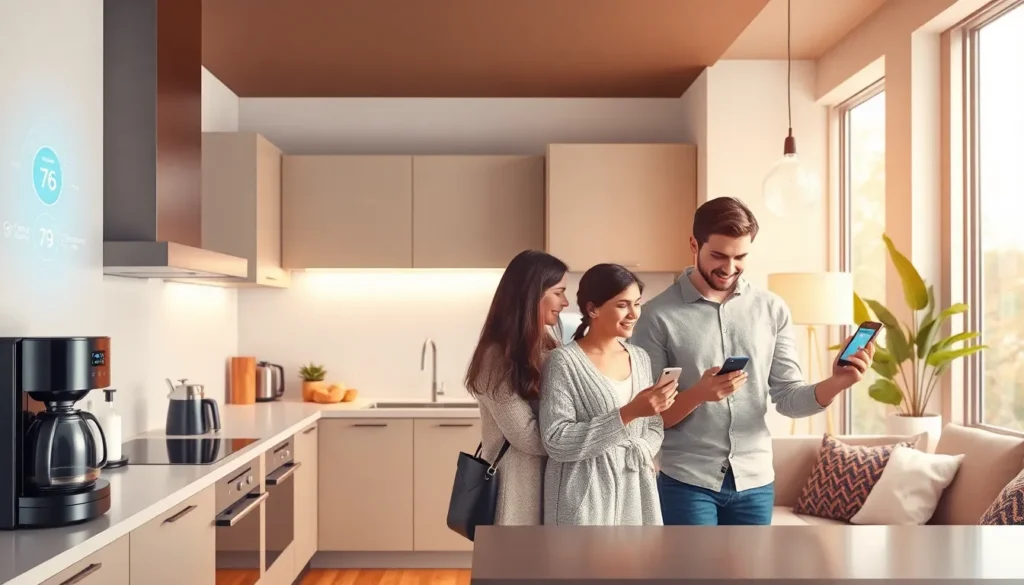Table of Contents
ToggleImagine waking up in a home that knows you better than your best friend. The smart homes of the future promise just that—homes that anticipate your needs, adjust the temperature to your liking, and even brew your morning coffee while you’re still in bed. It’s like having a personal butler, minus the awkward small talk.
Overview of Smart Homes of the Future
Future smart homes are equipped with advanced technology that anticipates and meets the needs of occupants. Integration of artificial intelligence plays a crucial role in managing household tasks, allowing for a tailored living environment. Automated systems control lighting, temperature, and security, enhancing both comfort and safety.
Homeowners interact with their smart environments through voice commands and mobile applications. Voice-activated assistants ensure convenience by enabling users to adjust settings from anywhere. Smart appliances, including refrigerators and ovens, streamline meal preparation and inventory management, reducing waste and enhancing efficiency.
Energy sustainability remains a priority. Future smart homes will utilize solar panels, smart grids, and energy-efficient appliances to minimize carbon footprints. Digital thermostats optimize heating and cooling schedules based on residents’ daily routines, resulting in significant energy savings.
Home security evolves with smart technology as well. High-definition cameras, motion detectors, and smart locks help protect residences. Remote monitoring allows homeowners to check their property anytime, giving peace of mind when away.
Moreover, interoperability among devices enhances functionality. Smart hubs connect different systems, from security to lighting, creating a cohesive experience. This interconnectedness fosters an environment where everything operates in harmony, enhancing the overall quality of life.
Future smart homes embrace personalized experiences. Sensors detect lifestyle patterns, adapting settings such as ambient lighting for relaxation or music preferences for gatherings. This focus on customization ensures each moment spent at home is enjoyable and effortless.
Key Technologies Driving Smart Homes

Smart homes rely on cutting-edge technologies to create advanced living environments. These tools enhance comfort, convenience, and energy efficiency.
Internet of Things (IoT)
The Internet of Things serves as the foundation for smart homes. Devices connect to the internet, allowing for seamless communication between appliances, systems, and users. Sensors monitor various conditions, including temperature and humidity. Homeowners receive real-time data, helping to optimize energy use. Smart thermostats adjust settings automatically, based on occupancy patterns. Some devices can even share information with each other, fostering a responsive living environment. By leveraging IoT, the interactions between systems enhance overall functionality and convenience.
Artificial Intelligence (AI)
Artificial Intelligence significantly transforms the smart home landscape. AI algorithms process data from connected devices to learn user preferences effectively. Notably, virtual assistants manage tasks, such as scheduling and controlling smart appliances. AI-enabled systems predict needs, adjusting lighting and temperature for maximum comfort. Predictive analytics offer insightful recommendations on energy usage, resulting in cost savings. Voice recognition technology allows for hands-free control, making daily life more manageable. Overall, AI not only increases efficiency but also personalizes experiences, ensuring homes adapt to individual lifestyles.
Benefits of Smart Homes
Smart homes offer numerous advantages that enhance daily living and create more sustainable environments. These benefits focus on convenience and energy efficiency, making them increasingly appealing to homeowners.
Convenience and Automation
Smart homes simplify everyday tasks through automation. Voice commands enable residents to control lighting, temperature, and appliances effortlessly. Timed routines allow devices to operate automatically, such as brewing coffee in the morning or dimming lights at night. Smart appliances provide updates about inventory levels, making meal preparation more efficient. Remote access via mobile applications means homeowners can monitor and adjust settings from anywhere. These streamlined processes reduce effort, foster relaxation, and enhance overall comfort.
Energy Efficiency
Energy efficiency stands as a critical advantage of smart homes. Digital thermostats adjust heating and cooling based on occupants’ routines, leading to significant energy savings. Homes equipped with solar panels capitalize on renewable energy sources, further reducing carbon footprints. Smart grids optimize energy usage, distributing power effectively during peak and off-peak hours. Additionally, energy-efficient appliances significantly lower electricity consumption. Homeowners enjoy financial savings, all while contributing to a more sustainable future.
Challenges and Considerations
Smart homes face several challenges and considerations that can affect their implementation and acceptance. Both security and privacy issues require significant attention.
Security Concerns
Security concerns arise as smart homes depend on interconnected devices. Vulnerabilities in device firmware can expose homes to breaches. Cybercriminals can exploit these weaknesses to gain unauthorized access, leading to theft or privacy violations. Networks of smart devices often lack robust security measures, making them targets for hacking attempts. Manufacturers need focus on implementing strong encryption protocols to safeguard data. Regular software updates also play a crucial role in addressing security vulnerabilities and maintaining device integrity. Homeowners must be proactive in securing their devices and networks across multiple entry points.
Privacy Issues
Privacy issues become increasingly prominent as smart devices collect personal data. Constant data collection raises concerns about how this information is stored and used. Manufacturers may share data with third parties, leading to potential misuse of sensitive information. Homeowners must understand the privacy policies associated with their devices and question data practices. The integration of voice assistants and cameras also complicates privacy, as they continuously monitor environments. Striking a balance between convenience and privacy protection remains essential for homeowners’ peace of mind. Users should consider adjusting privacy settings and only selecting devices from trusted manufacturers.
Future Trends in Smart Home Technology
Emerging trends in smart home technology showcase a shift toward more intuitive and personalized environments. Advanced sensors will intelligently respond to family activities, adjusting settings for optimal comfort without user input. Voice activation will gain greater sophistication, allowing for complex command executions beyond simple tasks.
Enhanced energy management systems will contribute significantly to sustainability. Smart homes will employ AI to analyze energy usage patterns, enabling homes to optimize themselves for maximum efficiency. Solar energy will become a standard feature, integrating with smart grids and battery storage that provide clean, renewable energy.
Device interoperability will enhance user experience, creating seamless communication between appliances. Smart hubs will unify various systems, ensuring that security cameras, lights, and climate controls work together effortlessly. Enhanced automation systems will streamline everyday tasks, making home management more convenient.
Personalized experiences will refine home living. Systems will analyze occupants’ routines, modifying settings automatically to suit individual preferences. AMBIENT lighting and curated playlists will adjust in real-time, enhancing the home atmosphere.
Increased security measures will also define future trends in smart homes. Biometric authentication will provide greater access control, enhancing safety. Data privacy will remain a priority, with manufacturers striving to implement robust encryption and transparent data usage policies.
The integration of health monitoring in smart homes will provide residents with real-time assessments of indoor air quality and environmental conditions. Smart appliances will notify users when maintenance is required, ensuring optimal functioning and preventing significant issues.
The landscape of smart homes will focus on intuitive automation, energy efficiency, and comprehensive security measures, making homes more convenient, safe, and environmentally friendly.
The future of smart homes promises a revolutionary shift in how people live and interact with their environments. With advancements in AI and IoT technology, homes will become more intuitive and responsive to individual needs. This evolution not only enhances comfort and convenience but also prioritizes energy efficiency and security.
As these technologies continue to develop, homeowners will enjoy a seamless blend of automation and personalization. The focus on sustainability and privacy will shape the smart home landscape, ensuring that convenience doesn’t compromise security. Embracing these innovations will lead to a smarter, safer, and more efficient living experience for everyone.




